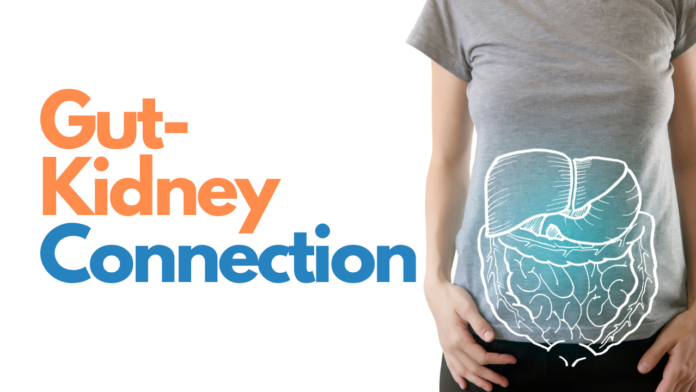Sponsored by: Renadyl™
When managing kidney disease, focusing solely on renal health isn’t enough. Recent research has shed light on the crucial role of gut health in overall wellness, particularly for patients with kidney disease. This article explores the significance of probiotics, prebiotics, diet, and lifestyle changes in supporting gut health and improving health outcomes for those with kidney disease.
The Gut-Kidney Connection:
The gut microbiome, a complex ecosystem of microorganisms in our digestive tract, is pivotal in maintaining overall health. Studies have shown a strong link between the gut and kidney health, highlighting the importance of nurturing a healthy gut environment to support renal function.
Probiotics: The Good Bacteria:
Probiotics are live microorganisms that confer health benefits when consumed in adequate amounts. These beneficial bacteria can help restore and maintain a healthy gut flora balance, which is often disrupted in individuals with kidney disease. Probiotics have shown promise in reducing inflammation, improving digestion, enhancing nutrient absorption, and boosting immune function. Incorporating probiotic-rich foods like yogurt, kefir, sauerkraut, and kimchi into the diet can benefit gut health.
Prebiotics: Food for the Good Bacteria:
Prebiotics are non-digestible fibers that nourish the beneficial bacteria in our gut. By selectively stimulating the growth of these bacteria, prebiotics help maintain a diverse and healthy gut microbiome. Foods such as onions, garlic, bananas, oats, and asparagus are excellent sources of prebiotics and should be included in the diet of individuals with kidney disease.
Dietary Considerations:
Beyond probiotics and prebiotics, implementing a kidney-friendly diet is crucial for managing kidney disease and supporting gut health. Helpful dietary changes include limiting sodium, phosphorus, and potassium intake while ensuring adequate protein intake. Additionally, consuming a variety of fruits, vegetables, whole grains, and lean proteins can provide essential nutrients and fiber necessary for a healthy gut microbiome.
Lifestyle Changes:
In addition to dietary modifications, certain lifestyle changes can contribute to better gut health and overall wellness. Regular physical activity can enhance digestion, reduce inflammation, and promote a healthy gut microbiome. Managing stress through relaxation techniques like meditation or yoga can also positively impact gut health. Adequate sleep and hydration are equally important in maintaining a healthy gut-kidney connection.
Consulting with Healthcare Professionals:
Patients with kidney disease need to consult with their healthcare team, including nephrologists and registered dietitians, to develop a personalized plan that addresses their individual needs. These professionals can provide guidance on appropriate probiotic and prebiotic supplementation and tailor dietary and lifestyle recommendations based on one’s personal circumstances.
Recognizing the intricate relationship between gut health and kidney disease opens new avenues for comprehensive management. Incorporating probiotics, prebiotics, kidney-friendly dietary choices, and lifestyle changes can significantly improve gut health and overall well-being for individuals with kidney disease. By nurturing the gut-kidney connection, we take a holistic approach to support renal function, reduce inflammation, and enhance quality of life.
Always consult with healthcare professionals before making any significant changes to your diet or lifestyle, especially if you have kidney disease.
Learn more about our sponsor Renadyl here https://bit.ly/3sZDWbb
About the author
Steven Belcher, RN, MSN, MS, is a dedicated kidney advocate who began his journey 20 years ago as a dialysis nurse. This job inspired him to help as many people with kidney disease as he could. Not only did he spend two decades caring for a patient’s physical and emotional needs in a clinical setting, but he also educated the public on the risk factors of kidney disease. Some of his many philanthropic successes include being a keynote speaker at the National Association of Nephrology Technicians/ Technologists (NANT), presenting at community spaces, and launching radio shows.
He now focuses his time entirely on his organization Urban Kidney Alliance, which educates the public about kidney disease. His goal? To lower rates of Chronic Kidney Disease in urban communities in Baltimore, Maryland, across the country, and globally through education and collaboration.
Steve has also written the book “HOW TO SURVIVE OUTPATIENT HEMODIALYSIS: A GUIDE FOR PATIENTS WITH KIDNEY FAILURE.” You can read the book review here.
*These statements have not been evaluated by the US Food and Drug Administration. This information is not intended to diagnose, treat, cure, or prevent any disease. Always consult with a qualified healthcare professional prior to beginning any diet or exercise program or taking any dietary supplement. The content on our website is for informational and educational purposes only.




